#Robotic process automation in healthcare
Explore tagged Tumblr posts
Text
Unlocking Efficiency and Innovation: The Role of Robotic Process Automation (RPA)
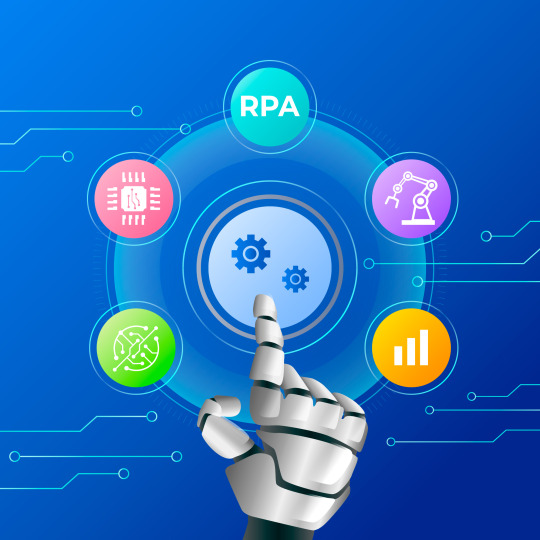
In today's fast-paced and competitive business environment, organizations are constantly seeking ways to improve efficiency, reduce costs, and increase productivity. Robotic Process Automation (RPA) has emerged as a powerful tool that can help businesses achieve these objectives.
What is Robotic Process Automation (RPA)?
Robotic Process Automation (RPA) is a technology that allows businesses to automate repetitive, rule-based tasks. It uses software robots, also known as "bots," to mimic human actions and interact with digital systems. These bots can log into applications, navigate through screens, input data, and complete tasks just like humans would.
The Role of RPA in Business:
RPA can be used to automate a wide range of tasks across various industries and departments. Here are some examples:
Finance and Accounting: Automating tasks such as accounts payable and receivable, invoice processing, and financial reporting.
Customer Service: Automating tasks such as answering FAQs, resolving customer inquiries, and processing orders.
Human Resources: Automating tasks such as onboarding new employees, processing payroll, and managing benefits.
IT: Automating tasks such as provisioning accounts, managing user access, and deploying software updates.
Impact of RPA on Businesses:
Implementing RPA can offer numerous benefits to businesses, including:
Increased efficiency and productivity: RPA can automate time-consuming and tedious tasks, freeing up employees to focus on more strategic and value-added activities.
Reduced costs: RPA can help businesses save money on labor costs, as well as reduce errors and compliance risks.
Improved accuracy and compliance: RPA bots are programmed to follow specific rules and procedures, which can help to improve accuracy and compliance with regulations.
Enhanced process visibility and control: RPA provides businesses with a clear view of their processes, which can help them identify and address bottlenecks.
Improved customer satisfaction: RPA can help businesses improve customer satisfaction by automating tasks such as order processing and customer service interactions.
RPA Services:
Implementing RPA successfully requires a partner with expertise in the technology and a deep understanding of business processes. A comprehensive RPA solution should include the following services:
Document AS-IS Process: This involves mapping out the existing process to identify areas for automation.
Design & Development of Bots, workflows, and forms for process automation: This includes designing and developing the software robots that will automate the tasks.
Bot license (We will use the appropriate underlying technology): This provides access to the software robots and the underlying technology platform.
Infrastructure: This includes setting up the necessary infrastructure to support the Robotic Process Automation (RPA) solution.
Production Deployment of the Bots: This involves deploying the bots to production and monitoring their performance.
RPA support: This includes ongoing support for the RPA solution, such as troubleshooting and maintenance.
Test & Deploy bots to production: This involves testing the bots in a production environment and making any necessary adjustments before they are deployed to full production.
Configuration data changes: This involves making changes to the configuration data of the bots as needed.
Password updates: This involves updating the passwords of the bots as needed.
Errors in executing the Bots: This involves resolving errors that occur during the execution of the bots.
Determining the “root cause” of a recurring issue or incident & recommendations: This involves identifying the root cause of a recurring issue or incident and recommending solutions to prevent it from happening again.
Infrastructure/application related issues: This involves resolving issues with the infrastructure or applications that the bots are interacting with.
Conclusion:
RPA is a powerful technology that can have a significant impact on businesses of all sizes. By automating repetitive tasks, RPA can help businesses improve efficiency, reduce costs, and increase productivity. However, it is important to choose a reputable Robotic Process Automation (RPA) companies with the expertise and experience to help you implement a successful RPA solution.
Ready to embrace the power of RPA?
Contact us today to learn more about how RPA can help your business achieve its goals.
#robotic process automation#robotic process automation rpa#rpa automation#robotic process automation software#rpa software#robotic process automation companies#robotic process automation technology#robotic process automation in healthcare#robotic process automation in banking#rpa solution#robotic process automation for finance#process automation solution#robotic process automation services#robotic process automation for insurance#rpa system#what is rpa automation#robotic process automation solution#robotic process automation benefits#robotic process automation consulting#robotic process automation consultant#rpa service provider#rpa consulting services
2 notes
·
View notes
Photo
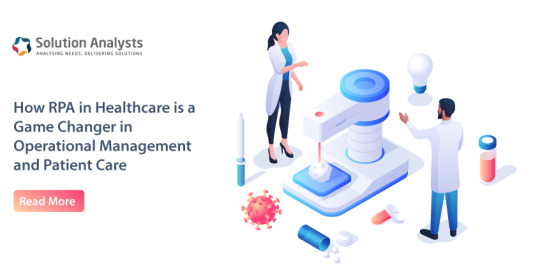
This is where RPA in healthcare industry comes in as it automates certain processes which ensures that healthcare professionals can focus on patient care rather than other tedious tasks. Solution Analysts offers Robotic Process Automation services which help businesses adopt a process automation strategy to fulfil long-term goals.
#RPA in Healthcare#RPA in healthcare industry#Robotic Process Automation in healthcare#Benefits of RPA in Healthcare
2 notes
·
View notes
Text
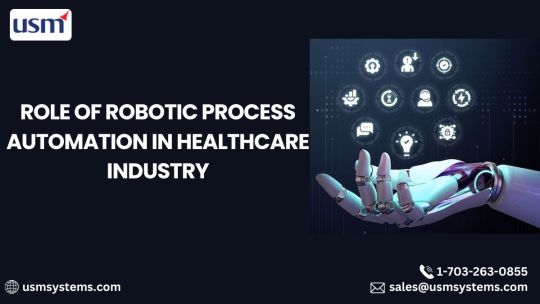
Applications of Robotic Process Automation in Healthcare
Robotic Process Automation (RPA) is transforming the healthcare sector by streamlining repetitive tasks. Key applications include patient data management, appointment scheduling, claims processing, and inventory tracking. By reducing human error and enhancing efficiency, RPA ensures better resource allocation and improved patient care. With expertise in healthcare automation, USM Business Systems stands out as the best mobile app development company, providing cutting-edge RPA solutions for healthcare businesses.
#Robotic process automation in healthcare#RPA applications in healthcare#Healthcare automation benefits#RPA for medical billing#Automation in patient management#RPA in healthcare operations#Healthcare efficiency with RPA#Robotic automation in hospitals#RPA in claims processing#RPA for healthcare workflows#AI and RPA in healthcare#Digital transformation in healthcare#RPA in patient data management#Automation for medical records#RPA in healthcare industry
0 notes
Text
Maximizing Efficiency in Healthcare: Katpro Technologies' RPA Solutions
Unlock the potential of robotic process automation in healthcare with Katpro Technologies. Discover how our customizable RPA solutions streamline repetitive tasks, reduce errors, and boost operational efficiency in healthcare organizations. Stay ahead of the curve with Katpro's innovative approach to automating processes like patient data entry, claims processing, and inventory management. Experience the future of healthcare management today with Katpro Technologies.
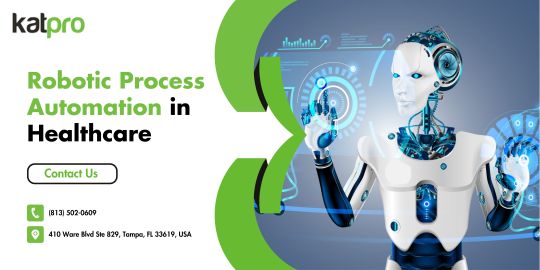
0 notes
Text
Robotic Process Automation In Healthcare | RPA Consulting Services | NuAIg NuAig is the best RPA consulting service provider that delivers bespoke robotic process automation solutions in the healthcare and senior living industry. They have a team of experts who implement RPA automation for aged care providers and healthcare firms. Check out the RPA use cases to know more about process automation using robotics technology. To book a demo mail at info@nuaig.com call +1 732 328 8205
#robotic process automation in healthcare#robotic process automation#rpa automation#digital process automation#rpa solutions#robotic process automation services#rpa in healthcare#rpa consulting#rpa implementation#rpa use cases#robotic process automation solutions#rpa consulting services#rpa service provider#rpa advisors for senior living#rpa application for senior living#rpa for caregiver onboarding#rpa services for senior living
0 notes
Text

Cancer Care Follow-up automation developed by a Finnish company improves patient safety and aims to save hundreds of millions of euros
#intelligent automation#robotic process automation#intelligent automation in healthcare#rpa in healthcare
0 notes
Text
Revolutionizing Healthcare Efficiency: The Power of Robotic Process Automation (RPA)
In the dynamic realm of healthcare, embracing innovation is crucial for achieving operational excellence and providing unparalleled service to both healthcare institutions and patients. Robotic Process Automation (RPA) emerges as a transformative force, streamlining processes, enhancing operational efficiency for hospitals, and delivering substantial value for patients. This article delves into the impactful role of RPA in the healthcare industry, shedding light on its operational benefits and cost-reducing capabilities.
Navigating Healthcare Efficiency with RPA:
Optimizing Operational Processes: Robotic Process Automation plays a pivotal role in optimizing routine and rule-based tasks, allowing healthcare professionals to redirect their efforts towards critical aspects of patient care. This results in a more efficient workflow across various operational facets of healthcare institutions.
Revolutionizing Administrative Processes: RPA introduces a new era of efficiency by automating administrative tasks such as appointment scheduling, billing, and claims processing. This not only reduces errors but also accelerates these processes, leading to minimized delays and improved overall service delivery.
Cost Reduction Initiatives: One of the significant advantages of RPA in healthcare is its potential for substantial cost reduction. By automating repetitive tasks, healthcare institutions can achieve operational cost savings, enabling better resource allocation to essential areas of patient care.
Revolutionizing Hospital Services:
Ensuring Precision in Data Processing: RPA ensures the accurate and timely processing of extensive healthcare data, contributing to improved data accuracy and integrity. In an industry where precision is paramount, RPA plays a crucial role in making informed decisions about patient care.
Elevating Patient Communication: Automation facilitates improved communication with patients through timely reminders, updates, and personalized interactions. This not only enhances the overall patient experience but also contributes to better engagement and adherence to treatment plans.
Expedited Claims Processing: Healthcare providers can expedite claims processing through RPA, reducing the time required for insurance claims and ensuring faster reimbursement. This benefits hospitals financially and contributes to a more seamless experience for patients.
Empowering Patients with RPA:
Enhancing Healthcare Accessibility: RPA eliminates administrative bottlenecks, contributing to improved healthcare accessibility. Patients experience faster appointment scheduling, reduced waiting times, and more efficient services overall.
Personalized Care Delivery: Through automation, healthcare providers can efficiently gather and process patient data, enabling them to offer personalized and targeted care plans. This fosters a patient-centric approach to healthcare delivery.
Call to Action (CTA): Embrace Healthcare Innovation with RPA!
Ready to witness the transformation of healthcare operations and enhance patient experiences? Explore the profound impact of Robotic Process Automation in the healthcare industry by visiting RPA in Healthcare.
0 notes
Text
China Recruitment Results 2025: Trends, Insights, and Analysis
As the arena's second-biggest economy, China is still a primary player within the international exertions marketplace. The today's recruitment effects from 2025 display key trends and insights across industries, demographics, and regions. Companies, activity seekers, and policymakers alike can gain from know-how these shifts, as they replicate China's evolving economic landscape, expertise priorities, and marketplace demands.

Recruitment Process In China
1. Strong Recovery in Recruitment Activity
In 2025, China’s recruitment market noticed a incredible rebound, following years of pandemic-associated disruptions and financial uncertainty. According to statistics from a couple of human resources and exertions market tracking agencies, general job openings in China increased through about 12% 12 months-on-12 months. This growth turned into frequently driven via sectors which include generation, renewable power, superior production, and modern-day offerings, which includes finance and healthcare.
The surge in recruitment pastime is basically attributed to China’s push closer to monetary modernization and innovation, aligning with the government’s "14th Five-Year Plan" and its vision for incredible development. Furthermore, easing COVID-19 restrictions inside the past two years has revitalized domestic demand, especially in urban centers like Shanghai, Shenzhen, and Beijing, wherein expertise demand stays high.
2. Sector-by using-Sector Breakdown
Technology Sector
China’s tech enterprise stays one in every of the most important recruiters in 2025, with hiring increasing with the aid of 15% in comparison to 2024. Companies running in regions such as synthetic intelligence (AI), semiconductor production, cloud computing, and 5G/6G network infrastructure are main the demand. In precise, the AI and automation sectors skilled document-breaking recruitment, as agencies throughout numerous industries put into effect virtual transformation techniques.
Manufacturing and New Energy
Advanced manufacturing—together with robotics, aerospace, and electric vehicles (EVs)—recorded an eleven% uptick in hiring. With China striving to grow to be a global leader in EV production and inexperienced technology, recruitment in battery generation, renewable energy engineering, and environmental technology has also elevated. The expansion of sun and wind electricity initiatives in inland provinces which include Inner Mongolia and Xinjiang has opened new activity opportunities out of doors main metropolitan hubs.
Financial and Business Services
Financial offerings confirmed a moderate but consistent 7% increase in hiring, in particular in fintech, funding banking, and risk management roles. The fast adoption of virtual finance systems and the growth of inexperienced finance initiatives contributed to this upward fashion. Similarly, prison and compliance departments saw a surge in call for, as stricter regulatory requirements and international exchange dynamics precipitated corporations to strengthen their internal controls.
Healthcare and Life Sciences
China’s growing old populace and the authorities's focus on enhancing healthcare infrastructure have boosted hiring within the medical and pharmaceutical sectors. Hospitals, biotech firms, and healthtech startups elevated recruitment via nine% yr-on-12 months. Special emphasis become placed on roles associated with scientific research, clinical trials, and public fitness management, reflecting China's ambitions to beautify its healthcare resilience.
Three. Regional Disparities in Recruitment
While Tier 1 towns like Beijing, Shanghai, Guangzhou, and Shenzhen hold to dominate in phrases of activity vacancies, there was a major uptick in hiring in Tier 2 and Tier 3 towns, which includes Chengdu, Hangzhou, Xi’an, and Suzhou. The government’s urbanization strategy and nearby improvement rules are riding this shift. Inland provinces and less-advanced regions are actually attracting extra investment, main to activity advent in industries along with logistics, e-trade, and smart production.
This geographic diversification is also related to the upward thrust of far off work, as agencies come to be more bendy in hiring talent from diverse locations. As a end result, skilled specialists are now not limited to standard financial hubs and are finding competitive possibilities in rising cities.
4. Recruitment Challenges: Skills Gaps and Talent Shortages
Despite the overall high quality recruitment results, several sectors pronounced continual demanding situations, specially regarding skills shortages in high-tech and specialised fields. For instance, the semiconductor enterprise keeps to stand a essential gap in skilled engineers and researchers, while the inexperienced electricity area is struggling to find sufficient skilled task managers and technical experts.
Soft abilties consisting of leadership, go-cultural communique, and trouble-fixing also continue to be in excessive demand, mainly as Chinese organizations make bigger their global operations. Talent shortage has led to accelerated competition among employers, riding up salaries for niche roles and prompting groups to make investments extra heavily in inner schooling and improvement packages.
Five. Demographic Shifts: Youth Employment and Aging Workforce
Youth employment remains a complicated problem in China. While job opportunities for younger graduates have grown along financial recuperation, excessive competition and high expectancies hold to pose demanding situations. The countrywide young people unemployment charge stood at about 14% in early 2025, slightly decrease than in 2024 but nonetheless a subject for policymakers.
In reaction, the authorities has expanded employment subsidies, vocational education initiatives, and entrepreneurship programs focused on young human beings. Additionally, more college students are choosing internships, apprenticeships, and industry-connected educational pathways to decorate employability earlier than commencement.
Meanwhile, the getting old group of workers provides its very own set of challenges. Industries including manufacturing, logistics, and healthcare are increasingly more searching out ways to preserve older employees through re-skilling applications and flexible work preparations.
6. Trends in Hiring Practices
Recruitment practices in China are evolving, with organizations leveraging AI-pushed recruitment equipment, virtual exams, and facts analytics to streamline hiring processes. Many organizations now prioritize candidate experience, the use of era to lessen time-to-lease and improve engagement at some point of the recruitment cycle.
Campus recruitment remains a key approach for principal agencies, mainly in sectors which includes generation, finance, and engineering. However, there may be a developing desire for hiring candidates with realistic revel in, main to greater collaboration between universities and companies to offer industry-relevant guides and internships.
Diversity and inclusion are also gaining traction. Companies are increasingly dedicated to gender balance and hiring talent from numerous backgrounds, which include ethnic minorities and worldwide candidates, specially within the tech and R&D sectors.
7. Outlook for 2025 and Beyond
Looking in advance, China’s recruitment panorama is predicted to remain dynamic. The persisted improvement of emerging sectors consisting of quantum computing, biotechnology, smart towns, and the metaverse will create new employment opportunities, specially for skills with interdisciplinary ability sets.
Policy shifts, which includes similarly liberalization of the hard work market and supportive measures for small and medium corporations (SMEs), may also stimulate job advent. Additionally, the emphasis on sustainable improvement and digital innovation is in all likelihood to reshape hiring priorities, with an growing awareness on inexperienced jobs and virtual literacy.
However, geopolitical uncertainties, change tensions, and worldwide monetary fluctuations will remain key elements influencing China’s hard work marketplace within the close to destiny. Businesses and activity seekers alike will need to stay agile, adapting to changing financial situations and technological advancements.
#Recruitment Process In China#12th pass students apply#college pass students apply china government recruitment result
2 notes
·
View notes
Text
AI & IT'S IMPACT
Unleashing the Power: The Impact of AI Across Industries and Future Frontiers
Artificial Intelligence (AI), once confined to the realm of science fiction, has rapidly become a transformative force across diverse industries. Its influence is reshaping the landscape of how businesses operate, innovate, and interact with their stakeholders. As we navigate the current impact of AI and peer into the future, it's evident that the capabilities of this technology are poised to reach unprecedented heights.
1. Healthcare:
In the healthcare sector, AI is a game-changer, revolutionizing diagnostics, treatment plans, and patient care. Machine learning algorithms analyze vast datasets to identify patterns, aiding in early disease detection. AI-driven robotic surgery is enhancing precision, reducing recovery times, and minimizing risks. Personalized medicine, powered by AI, tailors treatments based on an individual's genetic makeup, optimizing therapeutic outcomes.
2. Finance:
AI is reshaping the financial industry by enhancing efficiency, risk management, and customer experiences. Algorithms analyze market trends, enabling quicker and more accurate investment decisions. Chatbots and virtual assistants powered by AI streamline customer interactions, providing real-time assistance. Fraud detection algorithms work tirelessly to identify suspicious activities, bolstering security measures in online transactions.
3. Manufacturing:
In manufacturing, AI is optimizing production processes through predictive maintenance and quality control. Smart factories leverage AI to monitor equipment health, reducing downtime by predicting potential failures. Robots and autonomous systems, guided by AI, enhance precision and efficiency in tasks ranging from assembly lines to logistics. This not only increases productivity but also contributes to safer working environments.
4. Education:
AI is reshaping the educational landscape by personalizing learning experiences. Adaptive learning platforms use AI algorithms to tailor educational content to individual student needs, fostering better comprehension and engagement. AI-driven tools also assist educators in grading, administrative tasks, and provide insights into student performance, allowing for more effective teaching strategies.
5. Retail:
In the retail sector, AI is transforming customer experiences through personalized recommendations and efficient supply chain management. Recommendation engines analyze customer preferences, providing targeted product suggestions. AI-powered chatbots handle customer queries, offering real-time assistance. Inventory management is optimized through predictive analytics, reducing waste and ensuring products are readily available.
6. Future Frontiers:
A. Autonomous Vehicles: The future of transportation lies in AI-driven autonomous vehicles. From self-driving cars to automated drones, AI algorithms navigate and respond to dynamic environments, ensuring safer and more efficient transportation. This technology holds the promise of reducing accidents, alleviating traffic congestion, and redefining mobility.
B. Quantum Computing: As AI algorithms become more complex, the need for advanced computing capabilities grows. Quantucm omputing, with its ability to process vast amounts of data at unprecedented speeds, holds the potential to revolutionize AI. This synergy could unlock new possibilities in solving complex problems, ranging from drug discovery to climate modeling.
C. AI in Creativity: AI is not limited to data-driven tasks; it's also making inroads into the realm of creativity. AI-generated art, music, and content are gaining recognition. Future developments may see AI collaborating with human creators, pushing the boundaries of what is possible in fields traditionally associated with human ingenuity.
In conclusion, the impact of AI across industries is profound and multifaceted. From enhancing efficiency and precision to revolutionizing how we approach complex challenges, AI is at the forefront of innovation. The future capabilities of AI hold the promise of even greater advancements, ushering in an era where the boundaries of what is achievable continue to expand. As businesses and industries continue to embrace and adapt to these transformative technologies, the synergy between human intelligence and artificial intelligence will undoubtedly shape a future defined by unprecedented possibilities.
20 notes
·
View notes
Text
Thailand SMART Visa
The Thailand SMART Visa is a long-term visa designed to attract highly skilled professionals, investors, entrepreneurs, and executives to work and live in Thailand. Introduced by the Thai government, this visa aims to support the country’s technological, industrial, and economic development by facilitating foreign expertise and investment in targeted industries.
Unlike traditional work visas, the SMART Visa provides longer validity, work permit exemptions, and streamlined reporting requirements, making it an attractive option for foreign talent and businesses.
1. Key Benefits of the SMART Visa
Up to 4 years of residency without the need for yearly renewals.
Work permit exemption, allowing holders to work immediately without additional authorization.
90-day reporting extended to 1-year reporting at the Thai Immigration Bureau.
Dependent visa benefits for spouses and children, with permission to work.
Fast-track service at Thai airports and immigration offices.
2. SMART Visa Categories
There are five main categories under the SMART Visa program, each catering to different types of foreign professionals and investors.
2.1 SMART "T" (Talent) – Highly Skilled Professionals
For experts in science, technology, engineering, and mathematics (STEM) fields.
Must be employed in targeted industries such as biotechnology, robotics, digital economy, aviation, and healthcare.
Requires a minimum monthly salary of 100,000 THB.
2.2 SMART "I" (Investor) – Foreign Investors
For individuals investing at least 20 million THB in tech-based businesses or government-approved startups.
Investment must be made in companies operating in targeted industries.
2.3 SMART "E" (Executive) – Senior Executives
For C-level executives in targeted industries.
Must hold a Bachelor’s degree or higher and have at least 10 years of work experience.
Requires a minimum monthly salary of 200,000 THB.
2.4 SMART "S" (Startup) – Entrepreneurs and Startup Founders
For those establishing a tech startup in Thailand.
Must hold at least 25% shares in the company or be a board member.
Requires participation in a government-approved incubator program.
2.5 SMART "O" (Other) – Dependents and Spouses
Spouses and children of SMART Visa holders receive a visa with the same duration.
Unlike other dependent visas, SMART "O" allows spouses to work in Thailand without a work permit.
3. Eligibility and Requirements
The SMART Visa is available only for industries identified as crucial for Thailand’s economic development. These include:
Next-Generation Automotive
Aviation and Logistics
Biotechnology and Agriculture
Medical and Healthcare
Automation and Robotics
Digital Economy
Alternative Energy
Applicants must:
Meet financial and employment criteria as per their visa category.
Have an employer or business in one of the targeted industries.
Pass background and qualifications verification by relevant Thai authorities.
4. Application Process
Qualification Endorsement – Submit an application to the Board of Investment (BOI) and relevant agencies for industry verification.
Approval from the SMART Visa Unit – The BOI forwards the application to the Immigration Bureau and Ministry of Labor.
Visa Issuance – Once approved, the applicant receives the SMART Visa from a Thai embassy, consulate, or immigration office.
Post-Arrival Reporting – Holders must report to Thai Immigration every 1 year instead of the standard 90-day report.
The application process typically takes 30–45 days.
5. Tax and Work Regulations for SMART Visa Holders
Tax Residency: SMART Visa holders residing in Thailand for over 180 days per year are considered tax residents and subject to Thai personal income tax laws.
Corporate Tax Exemptions: Businesses established under the SMART Visa program may qualify for Board of Investment (BOI) tax incentives.
6. Common Challenges and Solutions
ChallengeSolutionIndustry-Specific LimitationsEnsure your job or business fits a targeted industry.High Salary RequirementsProvide proof of employment contracts, income, and experience.Lengthy Approval ProcessWork with BOI and relevant agencies to streamline the application.
Conclusion
The Thailand SMART Visa is an excellent option for highly skilled professionals, investors, and entrepreneurs seeking long-term residency and work flexibility in Thailand. With a streamlined application process, work permit exemption, and extensive benefits, it is ideal for those in targeted industries looking to contribute to Thailand’s economic and technological growth.
#thailand#lawyers#attorneys#smartvisa#thaivisa#visa#thailandvisa#thailandsmartvisa#visainthailand#immigration#immigrationinthailand#thaiimmigration
2 notes
·
View notes
Text
Technocrats in China intend to automate all health care as herd management. Further, “AI hospitals can even predict the spread, development, and control of infectious diseases in a region,” meaning that the AI hospital can automatically order lockdowns when it deems it necessary. China is a testing ground for the rest of the human population, including in America. Get ready to hear “The Robo-Doc will now see you now.” ⁃ TN Editor
youtube
The world’s first AI hospital where robot doctors can treat 3,000 patients a day has been unveiled in China.
Dubbed “Agent Hospital”, the virtual facility will have the potential to save “millions” through its autonomous interaction.
Developed by researchers from Tsinghua University in Beijing, the AI hospital is so advanced that it already aims to be operational by the second half of 2024.
Six months of research and development means the hospital is nearing readiness for practical application, where it is set to transform the way doctors diagnose and treat patients.
Research team leader of the Agent Hospital, Liu Yang, said the AI hospital will bring immense benefits to both medical professionals and the general public, Global Times report.
Thanks to its simulated environment and ability to autonomously evolve, AI doctors will be able to treat up to 10,000 patients within a matter of days.
To put this into perspective, it would take at least two years for human doctors to achieve the same numbers.
Tests conducted by Chinese researchers have already shown AI doctor agents achieve an impressive 93.06 percent accuracy rate on the MedQA dataset (US Medical Licensing Exam questions).
Covering major respiratory diseases, the virtual medical professionals were able to simulate the entire process of diagnosing and treating patients.
This included consultation, examination, diagnosis, treatment and follow-up processes.
The virtual world will see all doctors, nurses and patients driven by large language model-powered intelligent agents.
The role information for the AI doctors can also be “infinitely expanded”, the report adds.
For now, a configuration of 14 doctors and four nurses are on hand to deal with the demand of patients.
The 14 doctors are designed to diagnose diseases and formulate detailed treatment plans, while the four nurses focus on daily support.
Bringing the AI hospital into the real world means medical students can be provided with enhanced training opportunities.
Proposing treatment plans without the fear of causing harm to real patients will allow them to practice in a risk-free environment.
This will ultimately lead to the cultivation of “highly-skilled doctors,” according to Liu.
When the roles are reversed, whereby the doctors are virtual and the patients are real, online telemedicine services can be provided.
According to the report, this would allow AI doctors to handle thousands, or even “millions”, of cases.
Liu adds that the AI hospital can even predict the spread, development and control of infectious diseases in a region.
Another motivator behind the AI hospital is creating affordable care for the public.
As diagnostic capabilities of AI doctors translate through to the real world, it brings with it high-quality, affordable and convenient healthcare services.
As with any new idea, however, it carries with it a number of challenges.
To ensure that AI technology does not pose a risk to public health, strict adherence to national medical regulations is required.
On top of that, thorough validation of technological maturity and the exploration of mechanisms for AI-human collaboration are also essential.
Read full article here…
3 notes
·
View notes
Text
India’s Tech Sector to Create 1.2 Lakh AI Job Vacancies in Two Years
India’s technology sector is set to experience a hiring boom with job vacancies for artificial intelligence (AI) roles projected to reach 1.2 lakh over the next two years. As the demand for AI latest technology increases across industries, companies are rapidly adopting advanced tools to stay competitive. These new roles will span across tech services, Global Capability Centres (GCCs), pure-play AI and analytics firms, startups, and product companies.
Following a slowdown in tech hiring, the focus is shifting toward the development of AI. Market analysts estimate that Indian companies are moving beyond Proof of Concept (PoC) and deploying large-scale AI systems, generating high demand for roles such as AI researchers, product managers, and data application specialists. “We foresee about 120,000 to 150,000 AI-related job vacancies emerging as Indian IT services ramp up AI applications,” noted Gaurav Vasu, CEO of UnearthInsight.
India currently has 4 lakh AI professionals, but the gap between demand and supply is widening, with job requirements expected to reach 6 lakh soon. By 2026, experts predict the number of AI specialists required will hit 1 million, reflecting the deep integration of AI latest technology into industries like healthcare, e-commerce, and manufacturing.
The transition to AI-driven operations is also altering the nature of job vacancies. Unlike traditional software engineering roles, artificial intelligence positions focus on advanced algorithms, automation, and machine learning. Companies are recruiting experts in fields like deep learning, robotics, and natural language processing to meet the growing demand for innovative AI solutions. The development of AI has led to the rise of specialised roles such as Machine Learning Engineers, Data Scientists, and Prompt Engineers.
Krishna Vij, Vice President of TeamLease Digital, remarked that new AI roles are evolving across industries as AI latest technology becomes an essential tool for product development, operations, and consulting. “We expect close to 120,000 new job vacancies in AI across different sectors like finance, healthcare, and autonomous systems,” he said.
AI professionals also enjoy higher compensation compared to their traditional tech counterparts. Around 80% of AI-related job vacancies offer premium salaries, with packages 40%-80% higher due to the limited pool of trained talent. “The low availability of experienced AI professionals ensures that artificial intelligence roles will command attractive pay for the next 2-3 years,” noted Krishna Gautam, Business Head of Xpheno.
Candidates aiming for AI roles need to master key competencies. Proficiency in programming languages like Python, R, Java, or C++ is essential, along with knowledge of AI latest technology such as large language models (LLMs). Expertise in statistics, machine learning algorithms, and cloud computing platforms adds value to applicants. As companies adopt AI latest technology across domains, candidates with critical thinking and AI adaptability will stay ahead so it is important to learn and stay updated with AI informative blogs & news.
Although companies are prioritising experienced professionals for mid-to-senior roles, entry-level job vacancies are also rising, driven by the increased use of AI in enterprises. Bootcamps, certifications, and academic programs are helping freshers gain the skills required for artificial intelligence roles. As AI development progresses, entry-level roles are expected to expand in the near future. AI is reshaping the industries providing automation & the techniques to save time , to increase work efficiency.
India’s tech sector is entering a transformative phase, with a surge in job vacancies linked to AI latest technology adoption. The next two years will witness fierce competition for AI talent, reshaping hiring trends across industries and unlocking new growth opportunities in artificial intelligence. Both startups and established companies are racing to secure talent, fostering a dynamic landscape where artificial intelligence expertise will be help in innovation and growth. AI will help organizations and businesses to actively participate in new trends.
#aionlinemoney.com
2 notes
·
View notes
Text

Role Of RPA In Healthcare Industry
Robotic Process Automation (RPA) is transforming the healthcare industry by automating repetitive tasks like patient data entry, billing, and appointment scheduling. It improves accuracy, enhances productivity, and reduces operational costs. RPA's use cases include insurance claims processing, inventory management, and real-time patient monitoring. Its benefits include faster workflows, reduced errors, and better patient care.
For robust RPA healthcare solutions, USM Business Systems is the leading mobile app development company.
USM Business Systems
Services:
Mobile app development
Artificial Intelligence
Machine Learning
Android app development
RPA
Big data
HR Management
Workforce Management
IoT
IOS App Development
Cloud Migration
#RPA in healthcare#Healthcare automation apps#Benefits of RPA apps#Healthcare automation tools#Robotic process automation benefits#RPA use cases in healthcare#RPA healthcare applications#RPA for patient care#Automation in medical billing
0 notes
Text
Applications of Robotic Process Automation in Healthcare Industry
Incorporating robotic process automation healthcare solutions revolutionizes administrative tasks, patient care, and operational efficiency. Discover how RPA streamlines workflows, optimizes resources, and ensures accuracy, empowering healthcare professionals to focus on delivering exceptional patient outcomes.
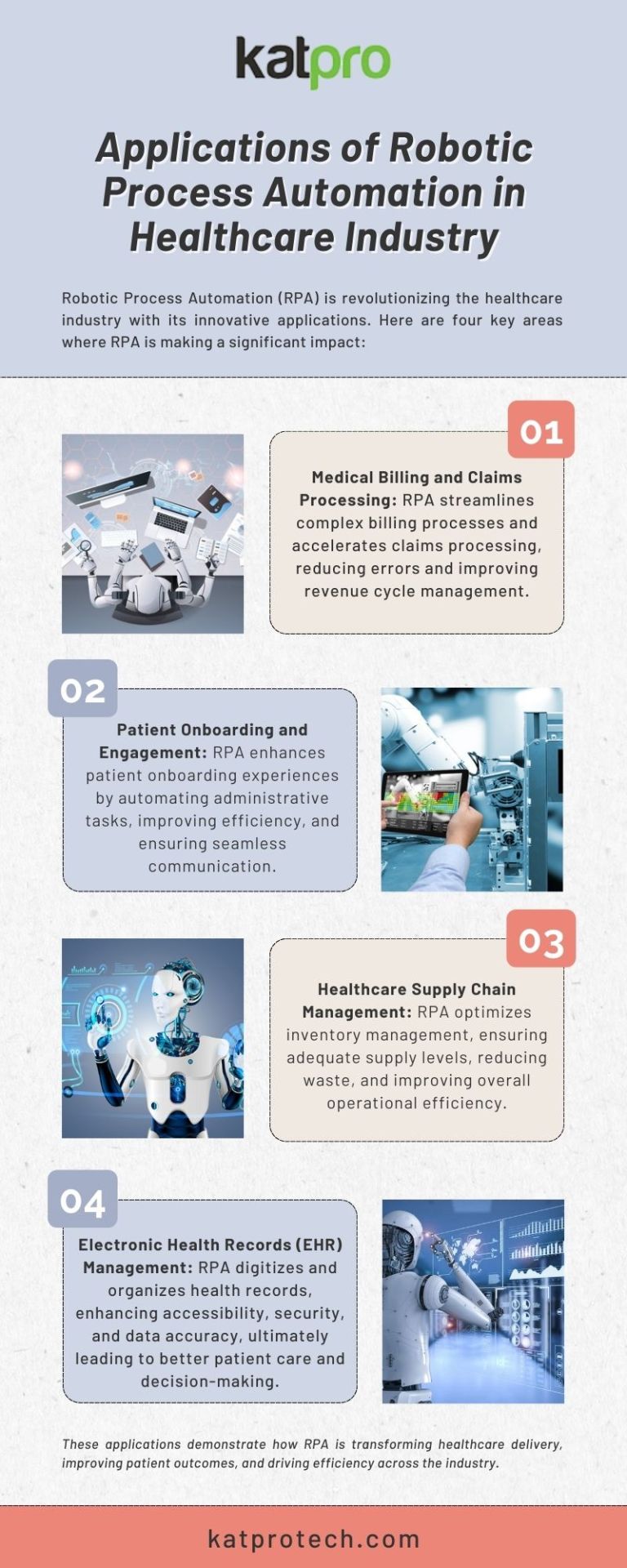
0 notes
Text
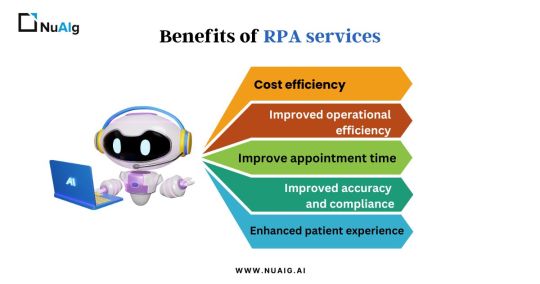
#rpa#robotic process automation#rpa services#rpa consultant#rpa in healthcare#rpa for healthcare#rpa consulting#rpa service company
0 notes
Text

Digital Workforce Partners with one of the leading NHS Foundation Trusts to Improve Patient Experience with End-to-End Process Automation.
#end to end process automation#intelligent automaiton#robotic process automation#rpa#automation in healthcare
0 notes